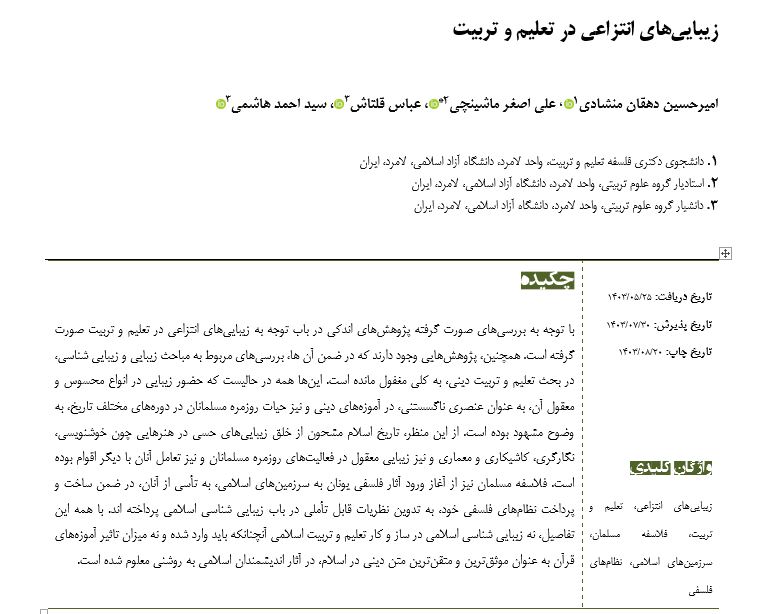Abstract Beauty in Education
Keywords:
Abstract beauties, education and training, Muslim philosophers, philosophical systems, Islamic landsAbstract
Given the conducted studies, little research has been carried out on the attention to abstract beauty in education. Additionally, there are studies in which discussions related to aesthetics and beauty in religious education have been largely overlooked. This is despite the fact that the presence of beauty, in both its tangible and abstract forms, is clearly evident as an inseparable element in religious teachings and the daily lives of Muslims throughout various historical periods. From this perspective, the history of Islam is replete with the creation of sensory beauty in arts such as calligraphy, painting, tilework, and architecture, as well as abstract beauty in the daily activities of Muslims and their interactions with other communities. Muslim philosophers, following the introduction of Greek philosophical works into Islamic territories, developed notable theories on Islamic aesthetics as part of their philosophical systems. Despite these details, Islamic aesthetics has not been adequately integrated into Islamic education, nor has the impact of Quranic teachings, as the most authentic and definitive religious text in Islam, been clearly established in the works of Islamic scholars.
Downloads
References
Hosseinzadeh Ua-B. A model for aesthetic education based on the principles of beauty in the Qur'an. Educational
Sciences from the Perspective of Islam. 2021;9(16):111-37.
Hosseinzadeh Ua-B, Sharfi M, Zibakalam F, Bagheri K. The educational aspects of the concept of beauty in the
descriptive compositions of the Qur'an and its implications in education. Research on Islamic Education Issues.
;20(17):103-22.
Ayazi SMA. The Holy Qur'an of Javidan. Tehran: Kitab Mobein; 2013.
Nikbakht Nasrabadi A. Investigating the effect of reciting the Quran on reducing pain in patients. Tehran: Tarbiat
Modares University; 2015.
Bagheri K. An introduction to the philosophy of education and training of the Islamic Republic of Iran. Tehran:
Scientific and Cultural Publications; 2008.
Bagheri K. A new look at Islamic education. Tehran: Madraseh Publications; 2012.
Balkhari Qahi H. The concept of beauty and the foundations of aesthetics in the Qur'an. Journal of Fine Arts-Visual
Arts. 2016(4).
Behrouz A. Educational dimensions of Quranic poetry. Tehran: University of Islamic Education; 2008.
Muzafar F, Aminpour A, Akhot A, Poursalehi A. Degrees of beauty, recognition and admiration of beauty derived
from the concept of good in the Quran. Islamic Architecture Researches, Islamic Architecture Scientific Pole. 2016;5(4):113-
Sharifi A, Rezazade Jodi M. The conceptual system of aesthetics in the light of the verses of the Holy Quran. Siraj
Munir Quarterly. 2014;6(21):1-28.
Sadeghzadeh A, Hosni M, Keshavarz S, Ahmadi A. The final report of the national research on education and training.
Mousavi FS. Educational points of Quranic stories (with emphasis on the stories of Hazrat Ayub and Hazrat Yahya
(pbuh)). Mazandaran: Mazandaran University; 2021.
Neller JF. Familiarity with the philosophy of education. Translated by Feridon Bazargan Dilmaghani ed. Tehran: Smet
Publications; 2013.

Downloads
Published
Submitted
Revised
Accepted
Issue
Section
License
Copyright (c) 2024 Journal of Study and Innovation in Education and Development

This work is licensed under a Creative Commons Attribution-NonCommercial 4.0 International License.










